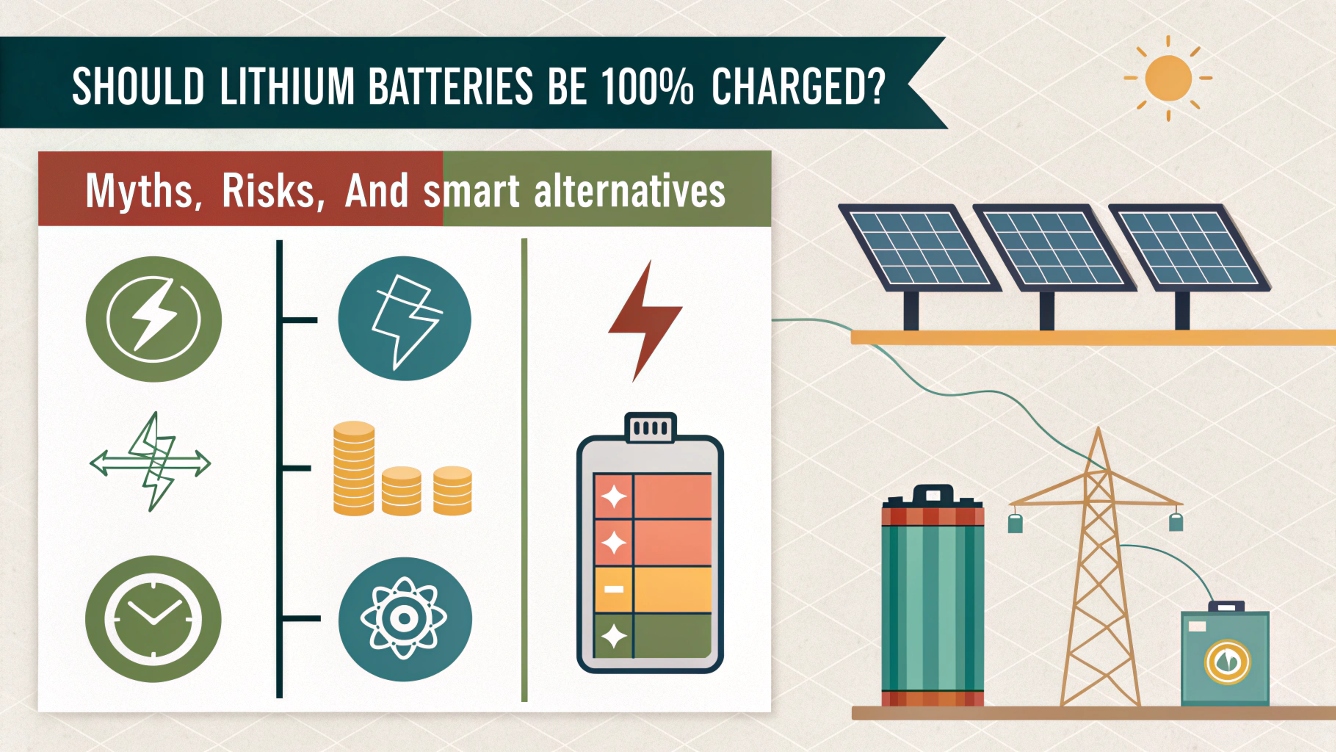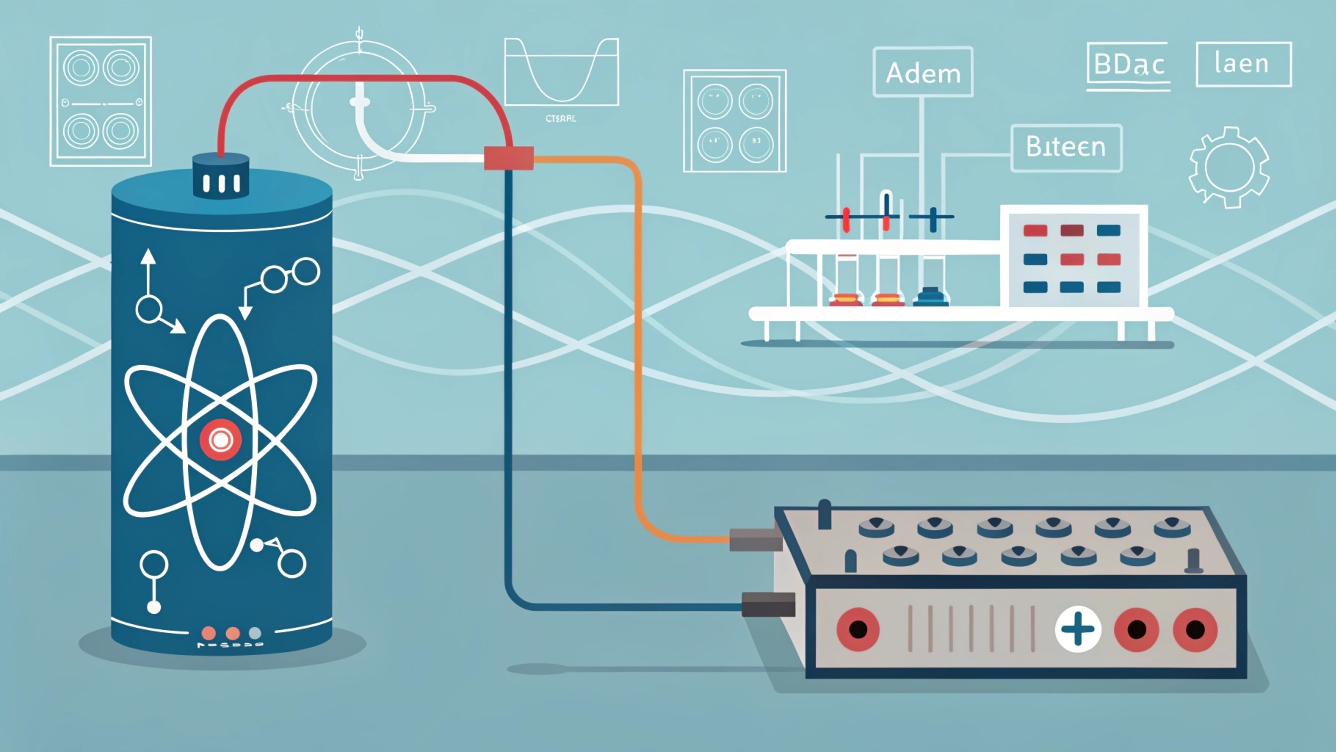리튬 배터리가 있어야합니다 100% 청구? 신화, 위험, 그리고 똑똑한 대안
리튬 배터리 충전의 과학: 왜 100% 이상적이지 않습니다
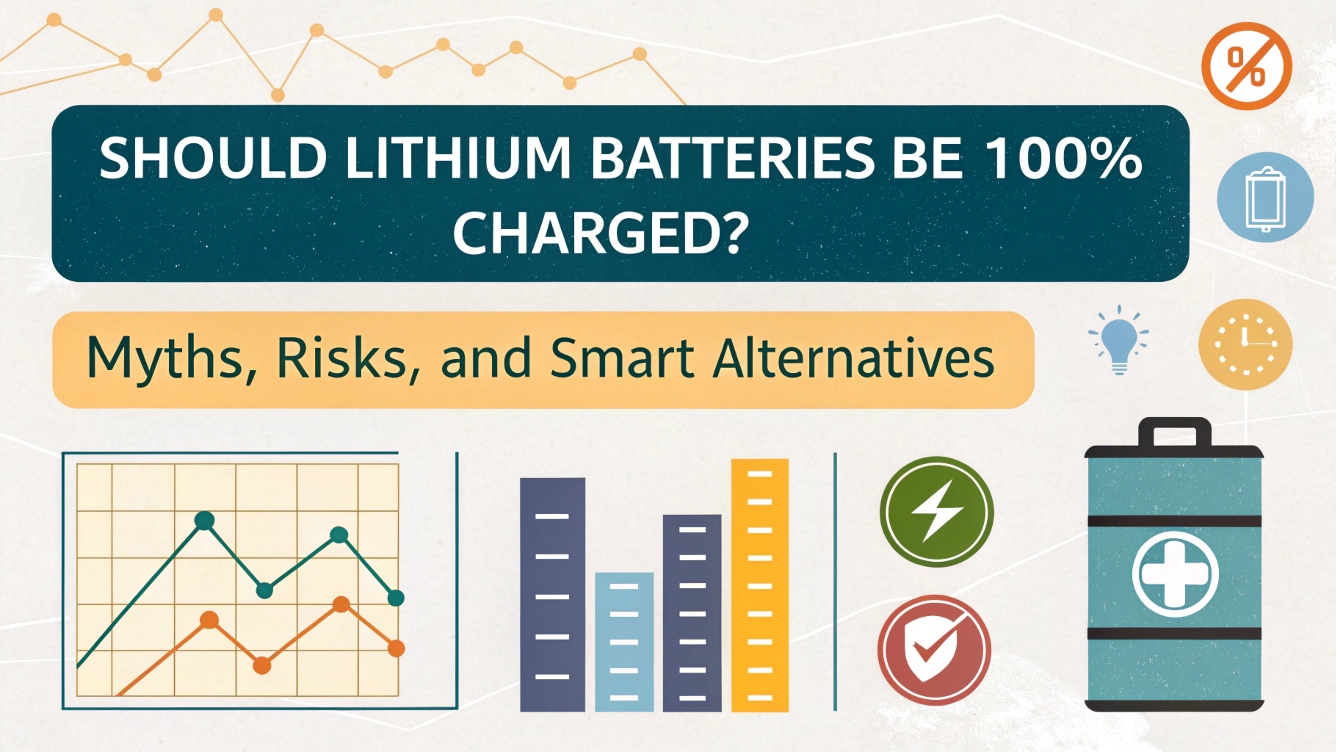
리튬 배터리는 스마트 폰에서 태양 저장 시스템에 이르기까지 모든 것을 전원, 그러나 그들에게 충전 100% 마라톤 러너가 끝없이 스프린트하도록 강요하는 것과 같습니다.. 이유는 다음과 같습니다:
- 화학 스트레스: 완전 충전, 리튬 이온 세포는 고전압에서 작동합니다 (4.2v/셀), 전해질 분해 및 리튬 도금 가속. 연구에 따르면 이것은 수명을 최대로 줄일 수 있습니다 20% 부분 충전과 비교합니다:인용문[8]:인용문[9].
- 열 런 어웨이 위험: 과충전은 과도한 열을 발생시킵니다, 화재 위험 증가. 예를 들어, 한계를 넘어 충전 된 12V 리튬 배터리는 열 런 어웨이 동안 1,500 ° F를 초과하는 온도에 도달 할 수 있습니다.:인용문[10].
- 용량 손실: 자주 충전 용량 저하 용량은 2-3 배 더 빠릅니다. 20-80% 충전 범위:인용문[9].
팁: 시스템과 짝을 이루십시오 쌓을 수 있는 리튬 배터리 하중을 분배하고 개별 세포 스트레스를 줄입니다.
언제 100% 충전이 의미가 있습니다: 규칙에 대한 예외
1. 인산염 철 (LiFePO4) 배터리
테슬라는 매주 추천합니다 100% 전압 센서를 다시 교환하기 위해 LifePO4 팩의 충전, 평평한 방전 곡선으로 인해 최신 추정이 까다로워집니다:인용문[6].
2. 장기 저장
리튬 배터리 보관 50% 충전은 노화를 최소화합니다. 하지만, 몇 달 동안 사용하지 않는 경우, 완전 전하는 깊은 방전 손상을 방지합니다:인용문[5]:인용문[7].
3. 비상 대비
오프 그리드 태양계 용, 때때로 전체 충전은 백업 전원 준비를 보장합니다. 사용 태양 전하 컨트롤러.
리튬 배터리 수명 최적화: 5 입증 된 전략
1. 부분 충전 (20-80% 규칙)
배터리 유지 20% 그리고 80% 전하는 스트레스를 줄입니다. 10kWh의 경우 쌓을 수 있는 리튬 배터리 체계, 이것은 의미합니다:
- 매일 사용: 요금 80% (8kwh usable).
- 긴 여행: 일시적으로 요금 100% 추가 용량:인용문[8]:인용문[9].
2. 온도 제어
- 이상적인 범위: 59 ° F – 77 ° F에서 충전하십시오 (15° C – 25 ° C).
- 극단을 피하십시오: 32 ° F 이하 충전 (0℃) 리튬 도금을 유발합니다; 113 ° F 이상 (45℃) 저하를 가속화합니다:인용문[8]:인용문[10].
3. 스마트 충전 기술
정차하는 적응 형 충전기를 사용하십시오 80% 기본적으로. 예를 들어, Apple의 최적화 된 배터리 충전은 사용자 습관을 배우고 전체 충전을 지연시킵니다.:인용문[3].
4. 깊은 배출을 피하십시오
아래에서 리튬 배터리를 배출하지 마십시오 20%. 돌이킬 수없는 손상을 방지하기 위해 20Ah를 유지하면 100AH 배터리를 재충전해야합니다.:인용문[5]:인용문[7].
5. 확장 성을위한 모듈 식 시스템
단일 배터리를 변형시키는 대신, 쌓을 수 있는 리튬 배터리 사용자가 허용합니다:
- 필요에 따라 용량을 추가하십시오 (예를 들어, 5kWh로 시작하십시오, 20kWh로 확장하십시오).
- 전체 시스템을 종료하지 않고 결함이있는 모듈을 분리하십시오:인용문[9].
사례 연구: 태양 광 주택 쌓을 수있는 리튬 배터리
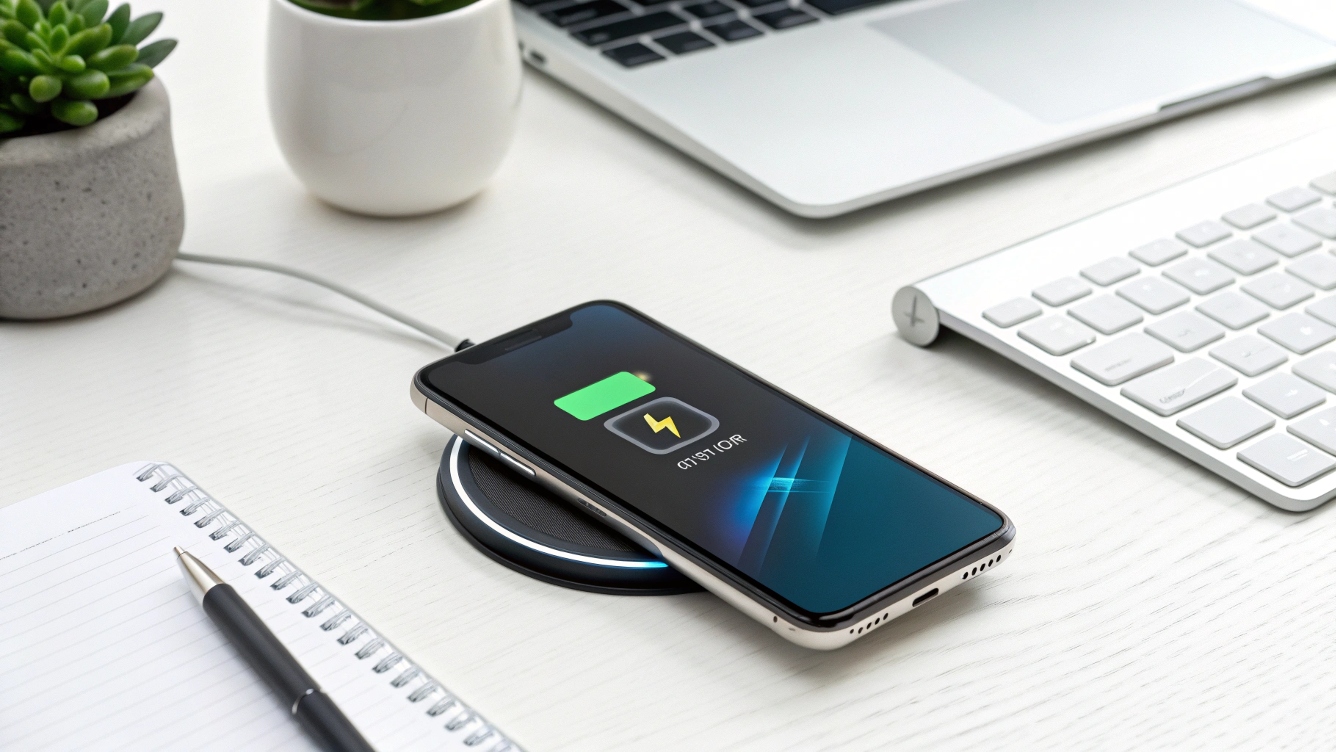
우리를 사용하는 애리조나에있는 가족 오프 그리드 태양열 키트 달성:
- 30% 더 긴 수명: 배터리를 충전하여 80% MPPT 컨트롤러를 통해 매일.
- 화재 안전: 온도 센서가있는 화실 캐비닛에 모듈을 저장합니다:인용문[10].
- 비용 절감: 전체 시스템 대신 개별 모듈을 교체합니다.
응용 프로그램 별 모범 사례를 청구합니다
| 애플리케이션 | 권장 충전 한도 | 메모 |
|---|---|---|
| 스마트폰 | 80% | 내장 된 "최적화 된 충전을 사용하십시오" 모드:인용문[3]. |
| EV | 90% (리오이온), 100% (LiFePO4) | Tesla의 LifePo4 팩에는 매주 전체 요금이 필요합니다:인용문[6]. |
| 태양 저장 | 85% | 쌍을 이루십시오 쌓을 수있는 시스템 로드 밸런싱을 위해:인용문[9]. |
| 전동 공구 | 75% | 많이 사용하는 동안 깊은 방전을 피하십시오:인용문[7]. |
미래 방지 모듈 식 배터리 시스템
업그레이드 쌓을 수 있는 리튬 배터리 제안:
- 유연성: 오래된 모듈과 새로운 모듈을 혼합하십시오 (예를 들어, 기존 10kWh 설정에 5kWh를 추가하십시오).
- 능률: 마모를 줄이기 위해 모듈의 균형 충전/방전 속도.
- 안전: 스마트 BMS를 통해 과열 셀을 자동으로 분리하십시오:인용문[9]:인용문[10].
팁: AI 구동 에너지 관리 소프트웨어와 결합하여 사용 패턴을 예측하고 충전주기를 최적화하십시오..
자주 묻는 질문: 당신의 가장 큰 관심사에 대답합니다
큐: 배터리를 충전 할 수 있습니까? 100% 가끔?
ㅏ: 예! 때때로 전체 요금 (예를 들어, 월간 간행물) 상당한 피해없이 배터리 미터를 다시 교환하는 데 도움이됩니다:인용문[6]:인용문[9].
큐: 배터리 건강을 모니터링하려면 어떻게해야합니까??
ㅏ: Bluetooth 지원을 사용하십시오 배터리 모니터 (우리에 포함 프로 시리즈 전압을 추적합니다, 온도, 그리고 사이클 카운트.
큐: 리튬 배터리의 수명은 얼마입니까??
ㅏ: 일반적으로 2,000 ~ 5,000 사이클 80% 국방부. 적절한 치료는 이것을 연장 할 수 있습니다 30%:인용문[8]:인용문[9].
결론: 더 똑똑한 충전, 더 긴 수명
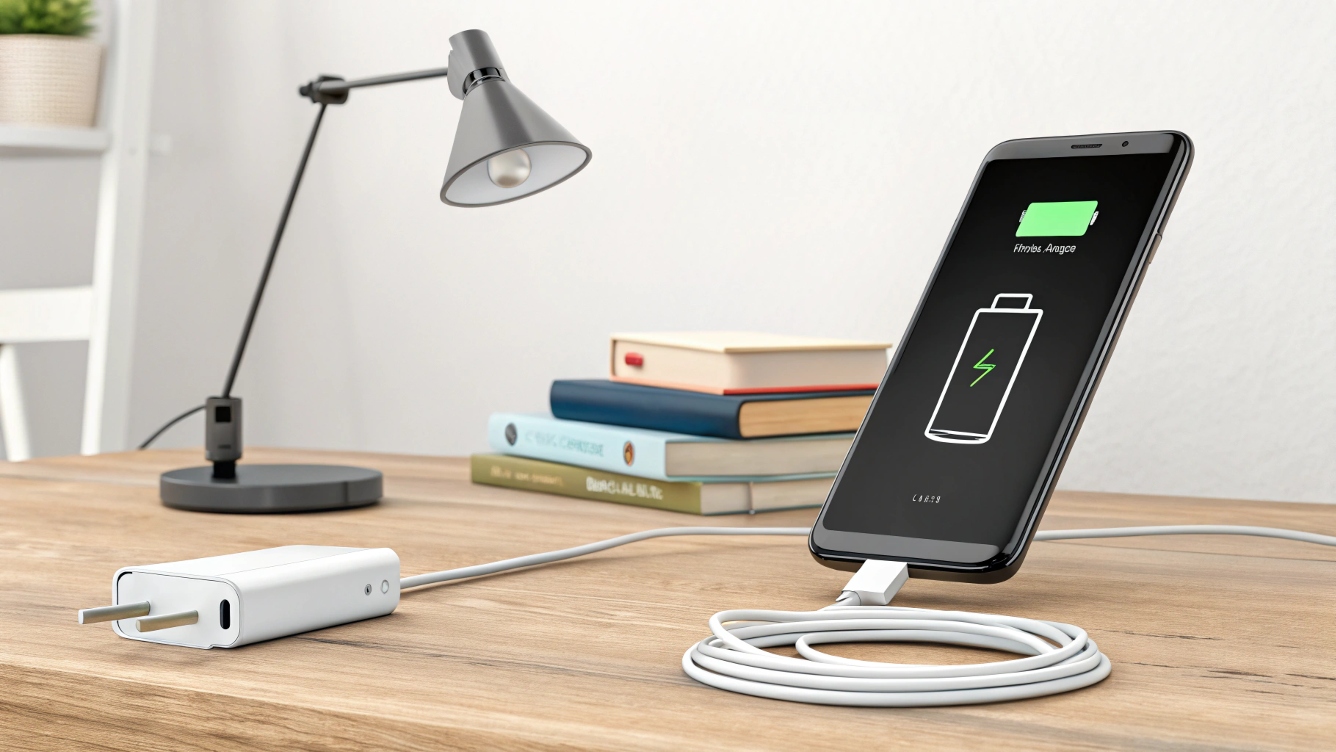
리튬 배터리 중 ~할 수 있다 청구됩니다 100%, 정기적으로 그렇게하는 것은 자동차 엔진이 논스톱으로 회전하는 것과 같습니다. 작동하지만 부품을 더 빨리 착용합니다.. 태양 광 애호가 및 그리드 오프 사용자를 위해, 쌓을 수 있는 리튬 배터리 확장 가능한 것을 제공하십시오, 스트레스가없는 솔루션.
다음 단계:
- 사용자 정의 가능한 스토리지를 위해 모듈 식 배터리 키트를 탐색하십시오.
- 다운로드 태양열 충전 가이드 DIY 팁.
- 충전주기 최적화에 대한 데모를 시청하십시오.
GycxSolar는 전 세계 고객에게 고품질 리튬 배터리 제품과 태양 에너지 시스템의 모든 구성 요소를 제공합니다..
태양 전지판 및 인버터와 같은 고품질 제품이 생산됩니다.. 또한 더 유리한 시스템 조합 솔루션을 귀하에게 권장합니다..
동시에, 무료 디자인 솔루션 서비스를 제공하는 전문가가 있습니다.
문제를 해결하기위한 원 스톱 서비스, 고품질 서비스는 GycxSolar를 업계의 선두 자리에 두어야합니다..
귀하의 상담은 매우 환영합니다. 디자인 체계는 항상 칭찬과 신뢰를 받았습니다., 매우 안정적인 고객 기반으로.
참조
- 리튬 배터리 화학: 위키 백과: 리튬이온 배터리.
- 열 런 어웨이 위험: 위키 백과: 리튬 배터리 화재.
- 순환 수명 데이터: 동료 검토 연구 전원 저널.

